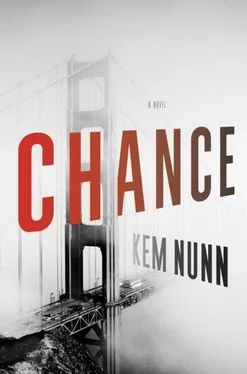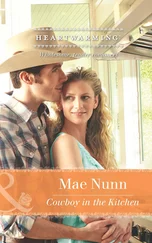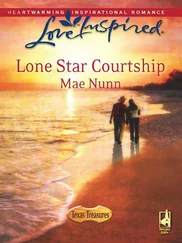Kem Nunn - Chance
Здесь есть возможность читать онлайн «Kem Nunn - Chance» весь текст электронной книги совершенно бесплатно (целиком полную версию без сокращений). В некоторых случаях можно слушать аудио, скачать через торрент в формате fb2 и присутствует краткое содержание. Город: New York, Год выпуска: 2014, ISBN: 2014, Издательство: Scribner, Жанр: Триллер, на английском языке. Описание произведения, (предисловие) а так же отзывы посетителей доступны на портале библиотеки ЛибКат.
- Название:Chance
- Автор:
- Издательство:Scribner
- Жанр:
- Год:2014
- Город:New York
- ISBN:978-0-7432-8924-5
- Рейтинг книги:4 / 5. Голосов: 1
-
Избранное:Добавить в избранное
- Отзывы:
-
Ваша оценка:
- 80
- 1
- 2
- 3
- 4
- 5
Chance: краткое содержание, описание и аннотация
Предлагаем к чтению аннотацию, описание, краткое содержание или предисловие (зависит от того, что написал сам автор книги «Chance»). Если вы не нашли необходимую информацию о книге — напишите в комментариях, мы постараемся отыскать её.
Chance — читать онлайн бесплатно полную книгу (весь текст) целиком
Ниже представлен текст книги, разбитый по страницам. Система сохранения места последней прочитанной страницы, позволяет с удобством читать онлайн бесплатно книгу «Chance», без необходимости каждый раз заново искать на чём Вы остановились. Поставьте закладку, и сможете в любой момент перейти на страницу, на которой закончили чтение.
Интервал:
Закладка:
D.K. is a 30-year-old right-handed white male last employed as a graphic artist in San Jose, now four years status post a pedestrian vs. truck injury at the Port of Oakland with resulting head injury. The patient states that while he is unaware of changes in his personality, he is also aware that others, including his wife, say that his personality has changed completely. His wife further states the patient has confided to her that he believes he will someday play a major role in a battle between Satan, Yahweh, and Jesus. Six months ago, in the context of believing it necessary to cleanse his body in preparation for the coming conflict, the patient ingested a range of household cleaners, including Hexol and Clorox…
Still, it was Mariella Franko who came along for the ride on those first dreary days of an unusually hot and early summer, hunting apartments in the City by the Bay, fielding papers from opposing attorneys, seeing patients, writing reports, watching as the money melted away like a late snow, departing with a good deal more rapidity and in greater amounts than it had ever arrived, watching as the life he’d so carefully arranged for himself, his wife, and daughter broke apart upon the rocks of a heretofore scarcely imagined reality.
His soon-to-be ex-wife, an aspiring photographer, was not self-supporting. Sales of her work could not be counted upon even for the rent of her studio. Her lover, with whom she had so recently taken up, a dyslexic personal trainer ten years her junior, worked only part time at a gym in Sausalito, and there would be little in the way of financial support from that quarter. Her attorney had already acquired a writ from a judge. Chance would be paying for both attorneys, his and hers. The house would be going on the market in the worst of markets. His daughter’s much beloved private school with its Monterey pines and views of the bay was appearing less likely by the day. The public school nearest their current home was the stuff of nightmare.
As for Ms. Franko in this time of drought and ash—the skies were so often thick with it of late, the result of fires sparked by some mishap in the Richmond refinery east of the bay, complicated by the unseasonable weather and dry, accompanying winds—she lived with her eighty-nine-year-old paternal grandmother in an apartment building on the south end of Palo Alto. At one point in his evaluation he had inquired as to how her grandmother had responded to the death of her only son. Mariella had said that her grandmother was very sad. She said her grandmother took medication on a daily basis but did not recall its name. She did not know if the older woman shared any of her recurring nightmares or intrusive recollections of the event that had claimed the life of their father and son.
Oddly enough it was Chance who had experienced a number of recurring nightmares together with intrusive memories and vivid recollections of the photographs he’d been asked to look at and these accompanied by the image of this shy and diminutive creature, alone in those still-dark hours, inquiring of the now speechless effigy at her side. Off this, he would move to imagining her out there in the apartment in Palo Alto, alone in some no doubt terminally banal setting, attempting to “distract herself by watching television.” What would she watch? he wondered. What could she possibly find that would not lead to the gouging out of one’s own eyes? The image suggested Lear and unaccommodated man, the thing itself. Job at least had God in the whirlwind. Mariella got police procedurals and vampire bloodletting. And that was just the news. He seemed to recall that she worked full time as a packager for Granny Goose potato chips in San Jose and that prior to the accident her interests had included painting, drawing, and collecting small statues of frogs.
There came a night, alone in his new apartment, half in the bag, he had actually gone so far as to imagine his driving the forty-five minutes it might take to reach her. She was not unattractive. In his report, he had described her as follows:
A petite 39-year-old woman of Italian descent with black hair that is pulled back tightly into a bun. She has straight, almost classical, features and large brown eyes. Her fingers are well manicured and she wears no nail polish. She wears a leather coat over a tan pin-striped suit and brown leather high-heeled lace-up boots. Her general manner, while pleasant, is marked by a total absence of spontaneity. The interview proceeded in a series of questions followed by unelaborated answers.
What he had thought but not recorded, what set her apart from so many of the others, was that she had about her some aspect of the caged bird, of a life un-lived. And it was just that, he thought, the horror of the life un-lived, that had found him out, in the midst of his own decline, wherein each day seemed at risk of being even more dimly lit than the one before it.
He held to the belief, possibly illusory, that there are times in a person’s life, moments really, when the right word or motion, when a single touch might wound or heal. It was to this end that he imagined the drive. It was not about some sexual conquest. He might just as easily have enlisted the aid of another had another arrived. It was the striking through that he envisioned, the freeing of the caged heart. He knew better, of course. He could see all of this for what it was, the half-mad quixotic gesture better dreamt than executed because well … because that was what life was like in the end. It was an image in a glass darkly. It was all just half lived. There would be no drives and no interventions. The workings of the world would not permit them. In lieu of these he opted for additional wine. But my God, he thought a moment later, refilling a glass, imagining for the simple sake of imagining it, his arriving unannounced upon her doorstep, what would she think? He heard the night made horrible with her screams.
He dozed thinking of Blake: “Every night and every morn / Some to misery are born… Every morn and every night / Some are born to sweet delight. / Some are born to sweet delight, / Some are born to endless night.” He woke later in the still dark to the waves of Ocean Beach through the walls of his room. Rising, he was treated by way of a bathroom window to a strange orange light upon the eastern sky—what he was willing to take as evidence that in the hills above the Richmond oil refinery, the fires continued to rage.
The Printz collection
The furniture was French Art Deco from the late thirties, the work of a well-known designer by the name of Eugene Printz. The set comprised a desk, a bookshelf, and two chairs. It was made of palm wood and oxidized brass, and worth a considerable amount of money. It would have been worth even more but some of the brass was missing from the bookshelf and desk, several strips that should have run along the bottom edges of each. He’d gotten it that way and had paid accordingly. Still, it was a beautiful set and he’d always enjoyed how it looked in the big house he’d shared with his wife and daughter. Viewed now, in the confines of the small apartment, the stuff seemed sad and out of place, if not outright ridiculous. Over time it had come to irritate him and he’d begun to consider selling it. There was a dealer who specialized in such stuff, a black gentleman of perhaps seventy or more, down on Market Street. Chance couldn’t recall the man’s name but he could remember the location of his store, which was within walking distance of his office, and resolved to go there at his earliest convenience. An opportunity presented itself within the week, a cancellation butting up against his lunch hour, and he set out on foot for the dealer’s showroom.
Читать дальшеИнтервал:
Закладка:
Похожие книги на «Chance»
Представляем Вашему вниманию похожие книги на «Chance» списком для выбора. Мы отобрали схожую по названию и смыслу литературу в надежде предоставить читателям больше вариантов отыскать новые, интересные, ещё непрочитанные произведения.
Обсуждение, отзывы о книге «Chance» и просто собственные мнения читателей. Оставьте ваши комментарии, напишите, что Вы думаете о произведении, его смысле или главных героях. Укажите что конкретно понравилось, а что нет, и почему Вы так считаете.












